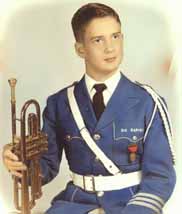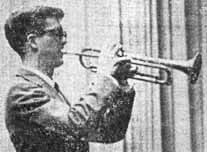
 |
Glen Newton posed for a portrait after winning his first Solo & Ensemble Festival medal in sixth grade. |
Accompanied by his mother, Dorothy Newton, Glen performed "The Golden Trumpet", by Major Chenette, in his first year of participation in the Michigan School Band and Orchestra Association's (MSBOA) Solo and Ensemble Festival. Although seventh and eighth graders normally entered the junior high division competition, Glen's band director, Aldie Long, felt that he was ready to give it a try in sixth grade.
The top award was a blue ribbon for first place, judged against an absolute standard, rather than against other competitors; a red ribbon was awarded for second place. Glen's rhythm was good, but he lost points for inconsistent articulation in parallel passages, unfocused tone (typical for a sixth grader), and missing the F at the end of the first chromatic run (hitting a D, then sliding up to the F). The solo's range extended to A above the staff, and although Glen was able to play the optional high C sometimes, he chose the alternate lower passage to avoid playing the C in the contest. The judge complimented him on this choice.
The Solo and Ensemble Festival had junior high and senior high divisions. Both divisions had district level competitions, but only senior high entries were eligible to progress to the state level. A senior high solo or ensemble that received a first place rating in the district contest could compete in the state contest. Judges at the state level expected more musical excellence than district level judges, for the entries to win comparable awards.
Since there was no rule prohibiting junior high school age players from entering the senior high division, the next year Glen played his solo (two movements from the Bernard Fitzgerald transcription of Arcangelo Corelli's "8th Sonata", which he still uses occasionally when performing for weddings and church services) in the senior high division and earned a first place at the district level. At the state contest, he earned a red second place ribbon.
He did likewise (receiving a blue ribbon at the district level and a red ribbon at the state level for his performance of Herbert L. Clarke's "Bride of the Waves") in his eighth grade year, the year he took six lessons from teacher Leonard V. Meretta, a faculty member at Western Michigan University in Kalamazoo.
In his freshman year, Glen finally earned a blue ribbon at the state level on his trumpet solo, "Prelude et Ballade", by Guillaume Balay. In the next three years, he progressed through Proficiency I, II, and III, earning additional blue ribbons and a place in the First Annual Michigan State Honors Band. The medals suspended from these ribbons had a distinctive shape (round), to indicate that they were earned through a proficiency examination.
His additional solos included "Petite Piece Concertante" by Guillaume Balay and "Fantasie en mi Bemol" by J. Ed. Barat. (Mr. Meretta, who was his judge for his Proficiency I and II examinations, chided him for repeating a previous solo rather than mastering a new one each year.)
Glen's mother accompanied him on all of his solos and duets and also accompanied Tony Wood's solos. She was always thoroughly prepared. During one performance, the very challenging piano part to "Fantasie en mi Bemol" slipped off the piano. Fortunately, the trumpet part had a rest at that moment, so Glen was able to pick up the music and replace it on the piano. Dorothy knew the music so well that she was able to keep going, not missing a note, during the entire episode.
 |
Glen's mother also accompanied him when he performed elsewhere, including playing a trumpet solo at a 1964 music honors ceremony. |
Glen also played in ensembles in the festivals, including performing an accompanied trumpet-cornet duet with Tony Wood (winning the judge's approval for the well-rehearsed rubato duet cadenza, but losing points for the choice of music because it was a polka); an accompanied trumpet-horn duet with Paul Dugas (for which Glen's mother wrote out a score, since the publisher hadn't provided one); an unaccompanied trumpet-trombone duet with Bob Huxol; third trumpet in a senior high brass sextet of "Patriot's Salute", a BRHS tradition at the time; trombone in a junior high brass sextet; bass drum in a drum quartet of "The Parade of the Wooden Soldiers" (losing points for playing the accents the way the music seemed to call for them, rather than as the arranger had written them); and first trumpet in several other brass sextets, including "The Trumpet Shall Sound" (which the judge thought they played too march-like).
In the 1950's and early 1960's, brass sextets were popular in schools. Unlike the brass quintets that are now popular, the brass sextet included a baritone or euphonium along with tuba, trombone, two cornets and either a third cornet or French horn. When Glen was in seventh grade, the Big Rapids High School band had no French horn players whose playing matched the caliber of the other sextet members, so they used three cornets or trumpets rather than two cornets and horn. By the time of the Solo and Ensemble Festival, Glen had been promoted to the band's first cornet/trumpet section and was one of the first trumpets in the dance band, thus bringing his musical abilities to the attention of the older sextet members and earning him an invitation to play with them. The senior high brass sextet received a first place rating in the district contest but only a third place rating at state, in part because the judge felt that "Patriot's Salute" (a medley of "America the Beautiful" and other patriotic songs) was an inappropriate selection for the contest. However, it gave Glen a chance to perform with some of his senior idols in the Big Rapids High School band, including first chair cornetist Marland Ream, who also sang bass in a barbershop quartet for the Band Follies.
Glen filled in for a state-level trombone duet at the last minute when the trombonist who was Bob Huxol's original duet partner at the district level got sick. He could have borrowed a trombone to play the duet but decided to avoid risking compromising his trumpet proficiency exam by playing a larger-mouthpiece instrument earlier in the day. Reading the bass clef was no problem, but the duet received a third place rating, largely because of a bad tactical decision. Glen played his part on the trumpet in the trombone range, rather than playing it an octave higher so that it would like in the comparable position in the trumpet range as the part was intended to lie in the trombone range, and the judge felt that this made the balance between the two instruments unacceptable.
| The junior high brass sextet experience was memorable because of a non-musical factor: stand compression. Playing the trombone he had bought with $25 of his own money, then fixed up to the point that it was playable, Glen sat down with the other sextet members in the performance room. As the group played, he had the strange sensation that his music stand was slowly rising, so Glen spread his feet farther apart to steady himself, just in case the stand was stationary and his chair was sinking. After the stand stopped rising, he figured out what had happened. The previous performer had played standing up, so Glen had pushed the music stand down to the appropriate level for a seated performance. However, this particular music stand was made so precisely and greased so well that the air in the bottom of the tube compressed and gradually expanded during the performance. |
During rehearsals of "The Trumpet Shall Sound", baritone player Joe Comer initially had a difficult time getting a good tone. Thinking the problem might be some obstruction in the bore, he removed his tuning slide and shook it. A piece of popcorn fell out. Oddly, this didn't improve the tone, so Joe investigated further. When he put his hand into the bell of the baritone, he discovered a crumpled-up, nearly empty, popcorn sack. Removing it made a big improvement in his tone!
Glen also accompanied a number of students for their solos. One of the more memorable was cellist Dave Baker, who had learned to play the instrument before moving to Big Rapids. (Dave played baritone in the concert band and valve trombone in the stage band.) This was Glen's first close encounter with a cellist, and he was unsure whether Dave was good or not, because he would frequently adjust his left hand to make the notes better in tune after initially reaching the note. He got his answer when the Solo and Ensemble judge gave Dave top marks in every category. Dave had not timed his solo, and after he and Glen had played for six or seven minutes, the room chairman asked them to stop. This was a bit embarassing, but Dave and Glen assumed the judge had heard enough and needed to move on to the next student. However, in the rating sheet, after praising Dave's tone and interpretation, the judge wrote, "I did not ask you to stop!"